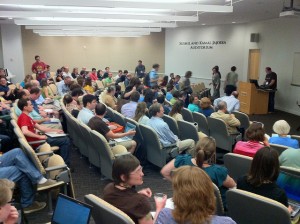“We already have an UnPress and it is called the internet” – Trevor Owens
THATCamp Prime, at George Mason University’s Roy Rosenzweig Center for History and New Media, taught me that a word does not make a new publishing model. The UnPress session was, surprisingly perhaps only to my naive mind, very complicated – with many tweets expressing frustration at just what an UnPress is or what it could contribute to scholarly publishing.
[blackbirdpie id=”77076039523766272″]
Despite the complexity, there was a feeling that the word “UnPress” (if nothing else) was compelling. For me, the power of the word was evidenced by its use in Jennifer Howard’s piece in The Chronicle on “Building a Better University Press” and its plug in the live-podcast recording of digital campus at THATCamp on Friday. There were also several suggestions for what an UnPress could accomplish in the session. For example, Dan Cohen and Amanda French discussed the possibility of an UnPress promoting content from scholars with low clout. Further, backchannel contributor Andy Famiglietti observed that a model of distributed review loosely based upon Wikipedia would be an interesting difference from traditional peer review. Here is a link to a GoogleDoc of the notes from the UnPress session.
However, I do agree with the sentiment that focusing on written forms of communication (the journal, the monograph) limits the potential of an UnPress. In the spirit of doing something with the UnPress that, as one camper exclaimed “push[es] for [what] hasn’t been possible before,” I’d like to outline some potential uses for the UnPress that go beyond traditional written academic communication.
- Multimodal Projects: As Mark Sample discussed in the session, Nick Montfort’s Curveship application offers users the ability to “tell events out of order, using flashback and other techniques, and can tell the story from the standpoint of particular characters and their perceptions and understandings.” Montfort uses it to create interactive fiction, but it could easily be ported to critical work. Curveship, in fact, made me think that perhaps the point of an UnPress is not to push for a certain form of content, but to encourage experimentation with modalities and styles that aren’t currently used by scholars.
- Undergraduate Research: Both Tonya Howe’s session on “Undergraduate Archiving” and Mark Sample’s session on “Building a Better Backchannel” mentioned the need for more ways to display and disseminate undergraduate research. The UnPress could serve as a repository for exhibiting undergraduate work like databases, archives and digital media applications. This would give students the ability to see their work impacting spaces beyond their particular classroom and, further, question the traditional assumption that scholarship is something separated from the act of teaching.
- Backchannel Archiving: I believe that backchannel conversations create a form of scholarly communication that should be recognized more as professional work – despite what David Morgen called the “fun” aspects of Twitter conversations. Since, as the “Backchannel” session emphasized, there is a need for better ways of archiving backchannel conversations – why not envision the UnPress as a space that encourages backchannel archiving (whether of conferences, speakers, or classes) as a form of publication?
- Bridging academia and publics: As David Parry argued a while ago in “Be Online or Be Irrelevant,” academic publishing needs to connect with a public who all-too-often doesn’t understand the value of work in the humanities. I think an UnPress needs to, in fact, drop the idea of scholarly communication and just talk about communication. Why should an UnPress feature work only by academics? Interesting work could emerge, for example, between academics and people working in social media PR. Of course, to me, an UnPress would be dedicated to open-source forms of sharing, but I’ve already learned quite a bit from my friends in the PR industry. As Leeann Hunter tweeted during MLA 2011:
[blackbirdpie id=”23537301871132673″]
If the University Press is about publishing individual research and enhancing the prestige of scholars and institutions, I envision the UnPress as a space that encourages ongoing, multimodal, and innovative collaboration connecting scholars to audiences who have traditionally been separated from academic discourse. The internet might be a place where an UnPress can exist, but in my view, there needs to be a more focused effort in making archivable and public collaboration happen.
You might be saying, “Yes, yes, Roger…that’s great, but let’s have an example project.” That’s what I, and hopefully some of you, could work on in the near future.


Pingback: THATCamp 2011 Roundup - ProfHacker - The Chronicle of Higher Education
Pingback: Notes from New Digital Scholarship / Unpress session | THATCamp Philly